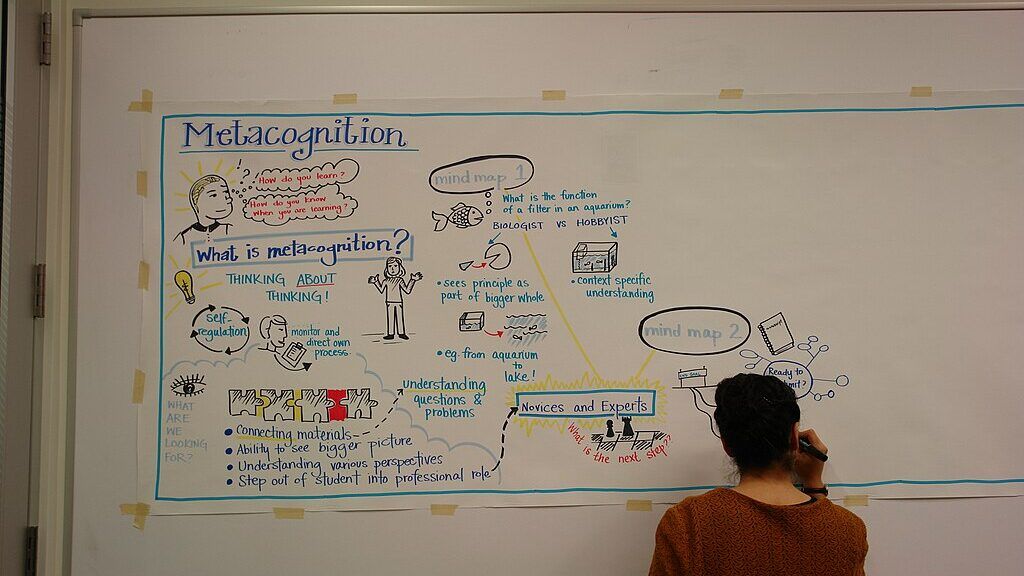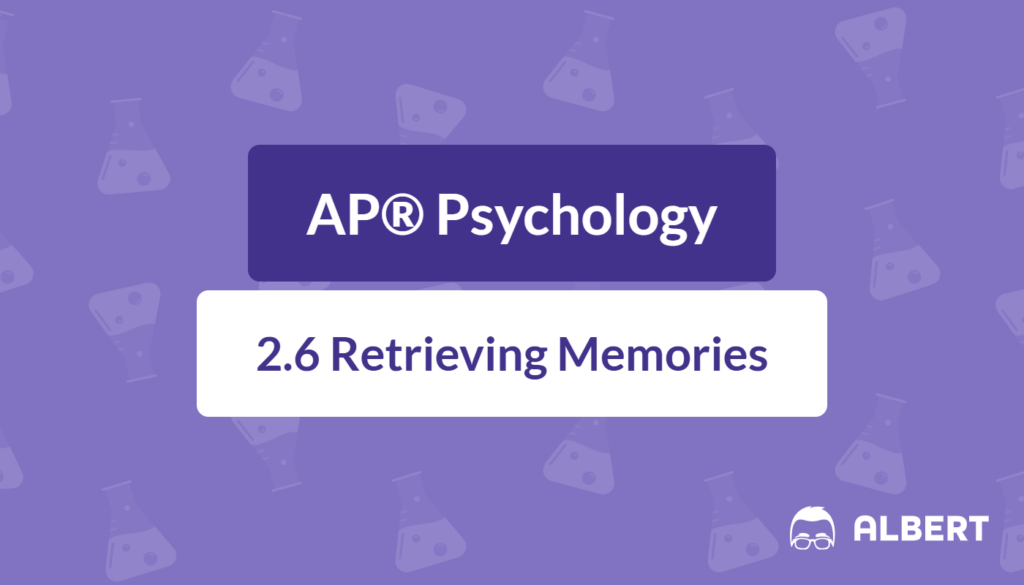Memory retrieval is a central part of learning and studying. It involves pulling out information from one’s memory and applying it at the right moment. However, many factors can affect how easily information is retrieved. Therefore, understanding how memory retrieval works can help students learn more effectively.
This article discusses the main concepts of memory retrieval, including recall vs. recognition, context-dependent memory, mood-congruent memory, state-dependent memory, the testing effect, and metacognition. Each section provides clear definitions, examples, and step-by-step problem solutions. By the end, students will have a solid grasp of how memory retrieval influences learning and academic performance.
What We Review
What is Memory Retrieval?
Memory retrieval is the process of accessing information that was previously stored in one’s mind. This process is critical for learning because it allows an individual to use past knowledge to solve current problems, complete tests, and engage in everyday tasks.
When information is encoded (learned) and then stored, the brain forms connections that may later be reactivated. However, it can be challenging to retrieve stored data if the situation or mood differs from when it was first learned. Therefore, studying how memory retrieval works can provide valuable insight into more efficient learning strategies.
Recall vs. Recognition
Recall
Recall means bringing information to mind without any specific aid. This process often appears in activities such as writing an essay or giving a free-response explanation. It requires a thorough memory trace because there are no options or prompts, just the open-ended call for knowledge.
- Example: A student studying the causes of the American Revolution must write a paragraph listing the major events and dates. That student must recall each fact from memory without hints.
Recognition
Recognition involves pinpointing the correct piece of information when given some form of a cue, such as multiple-choice questions or true/false statements. Because prompts are available, recognizing the right item is generally easier than recalling it independently.
- Example: On a history exam with multiple-choice questions, a student sees four dates and must identify which date corresponds to the start of a key event.
Example Problem: Recall vs. Recognition
A student, Emily, is preparing for a history test on ancient civilizations. One section of the test is an essay where she must write about the Phoenician trade network. Another section has multiple-choice questions on Greek city-states.
- The essay question demands Emily to recall facts about Phoenician trade routes, major goods traded, and core historical figures.
- The multiple-choice section offers possible answers concerning the city-states and their leaders.
- During the test, Emily successfully recalls important details for her essay. However, she struggles a bit with the multiple-choice section, even though recognition typically provides cues.
- This example shows how recall requires Emily to search her memory independently, while recognition lets her choose the correct information from given options.
The Role of Context in Memory Retrieval
Context can significantly affect how easily someone retrieves information. Returning to the same environment or mental state can strengthen retrieval cues, making it more likely to remember details.
Context-Dependent Memory
Context-dependent memory occurs when studying and recalling information in the same or very similar environment boosts retrieval. Classrooms, libraries, or even specific smells can act as anchors that help the brain access related information.
- Example: A student who learns vocabulary words in the library may recall them more effectively when tested in the same library setting.
State-Dependent Memory
State-dependent memory involves one’s physical or mental condition during encoding and retrieval. This concept suggests that a student who studies while relaxed may recall more effectively when feeling equally relaxed, compared to when anxious or stressed.
- Example: Someone who usually has a cup of tea and feels calm during study sessions might perform better on a test when they maintain that same calm state.
Example Problem: Context and State-Dependent Memory
Suppose a student, Carlos, prepares for a math quiz in a quiet corner of the library. While studying, he listens to soft instrumental music. On test day, he takes the quiz in the same quiet library area with the same music playing.
Steps to see how context and state affect retrieval:
- Carlos encodes the math information in a specific environment with consistent background sound.
- On the day of the quiz, he replicates those conditions.
- Because the environment and mental state match his study conditions, Carlos finds it easier to retrieve the formulas and solutions.
- This scenario illustrates how context-dependent and state-dependent memory can improve recall.
Mood and Memory Retrieval
Mood also plays a crucial role in picking out certain memories. One of the most notable effects is mood-congruent memory, which suggests that an individual’s current emotional state influences the type of memories recalled.
Mood-Congruent Memory
Mood-congruent memory explains how being in a specific mood makes it easier to remember memories that match that mood. Feeling cheerful can make one remember positive experiences; feeling sad may bring negative events to mind.
- Example: When someone is happy, past celebrations or fun times with friends are easier to recall than unfortunate events.
Example Problem: Mood-Congruency Effect
Imagine Alex experiences two study sessions: one while feeling very upbeat and another while feeling gloomy.
- During the happy study session, Alex focuses on success stories and encouraging quotes.
- During the gloomy session, Alex also studies content but feels less motivated and reviews more negative outcomes.
- On test day, if Alex is in a good mood, it becomes easier to access details related to the positive session, like motivational quotes.
- This result demonstrates how mood-congruent memory influences which details surface during retrieval.
Improving Memory Retrieval
Many students wonder how best to strengthen their memory. Practicing retrieval through quizzes and self-tests can significantly boost retention. Moreover, being aware of what is well understood vs. what is uncertain helps refine study strategies.
Testing Effect
The testing effect reveals that practicing retrieval through regular quizzes or practice exams improves long-term memory. Repeatedly pulling facts out of the mind strengthens the neural pathways responsible for storage and recall.
- Example: Quizzing oneself after every chapter leads to better retention of formulas, definitions, or dates than simply re-reading notes.
Metacognition
Metacognition means thinking about one’s own thinking. It involves assessing whether a topic is well understood or requires more review. By recognizing one’s level of comprehension, learners can target weak spots and avoid overconfidence.

- Example: A student who monitors how much time is spent on challenging concepts and adjusts study strategies accordingly is using metacognition.
Example Problem: Testing Effect
Rhea is preparing for a biology exam. She decides to test herself rather than just reread the textbook.
- On Day 1, Rhea studies a chapter on cell structure.
- She creates a short quiz and attempts to answer questions without looking at her notes (employing recall).
- Whenever she struggles or forgets a term, she checks her notes for clarity.
- On Day 2, she repeats the process for the next chapter, keeping the testing process frequent.
- By relying on the testing effect, Rhea strengthens her ability to retrieve information, leading to improved exam performance.
Summary of Key Concepts
Recognizing different approaches to memory retrieval is vital for effective studying. Recall vs. recognition, context-dependent memory, mood-congruent memory, and state-dependent memory can all influence how quickly and accurately information is retrieved. In addition, practices like the testing effect and metacognition boost learning by emphasizing active thinking and retrieval.
Students can apply these ideas by testing themselves under similar conditions in which they will be examined, and being mindful of their mood and environment. When consistently applied, these strategies can lead to better academic outcomes and deeper understanding.
Conclusion
Memory retrieval serves as the link between learning information and using it competently. Understanding recall, recognition, context-dependent memory, mood-congruent memory, state-dependent memory, the testing effect, and metacognition can sharpen study methods. Effective retrieval practices also help overcome forgetfulness by building stronger neural connections.
Students are encouraged to apply these principles in their daily study routines. By paying attention to context, mood, and testing strategies, learners can maximize retention and boost exam performance. Ultimately, embracing these memory retrieval techniques leads to greater academic success and a more confident approach to new challenges.
Quick Reference Chart: Memory Retrieval Vocabulary
| Vocabulary Term | Definition |
| Memory Retrieval | The process of accessing information stored in memory. |
| Recall | Retrieving information without cues. |
| Recognition | Identifying information with the help of cues. |
| Context-Dependent Memory | Improved recall when in the same environment as the learning occurred. |
| Mood-Congruent Memory | Recalling memories consistent with one’s current mood. |
| State-Dependent Memory | Better recall when in a similar physical or mental state as during learning. |
| Testing Effect | Enhanced memory performance through retrieval practice. |
| Metacognition | Awareness and understanding of one’s own thought processes. |
These terms highlight the main concepts of how recall vs. recognition, context-dependent memory, mood-congruent memory, state-dependent memory, the testing effect, and metacognition work together to boost learning.
Sharpen Your Skills for AP® Psychology
Are you preparing for the AP® Psychology test? We’ve got you covered! Try our review articles designed to help you confidently tackle real-world AP® Psychology problems. You’ll find everything you need to succeed, from quick tips to detailed strategies. Start exploring now!
- Sensation vs Perception Psychology: AP® Psychology Review
- Types of Thinking in Psychology: AP® Psychology Review
- Types of Memory: AP® Psychology Review
Need help preparing for your AP® Psychology exam?
Albert has hundreds of AP® Psychology practice questions, free response, and full-length practice tests to try out.








